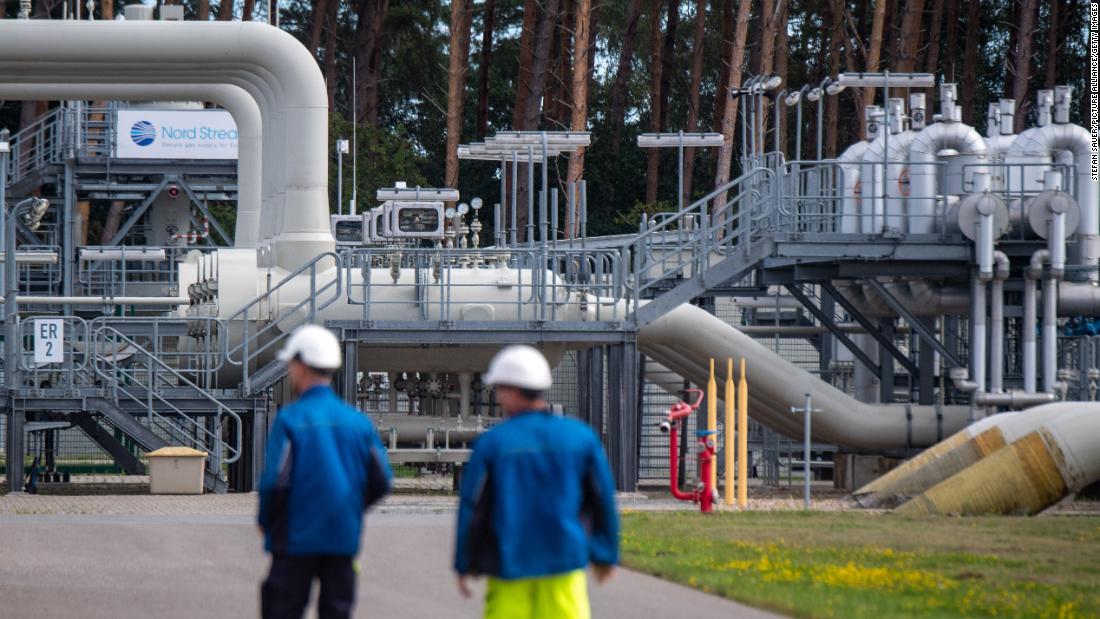Inflation and gas shortage, two problems that overwhelm Europe 6:07
(CNN Business) --
Europe's energy crisis is deepening as Russia further limits natural gas exports, forcing governments to spend billions of euros to protect businesses and consumers from skyrocketing bills as the region slides into recession.
Benchmark European natural gas prices soared 28% on Monday morning to 274 euros ($272) per megawatt hour, on the first trading day after Russian energy giant Gazprom indefinitely halted flows. through the vital Nord Stream 1 pipeline, claiming it had found an oil leak from a turbine.
Last year, the pipeline delivered about 35% of Europe's total Russian gas imports.
But since June, Gazprom had reduced flows along Nord Stream 1 to just 20% of capacity, citing maintenance problems and a dispute over a lost turbine caught up in Western export sanctions.
Moscow's decision not to reopen the pipeline on Saturday fueled concerns that the European Union could run out of gas this winter, despite a successful effort to fill storage tanks.
Similar fears in the UK sent wholesale natural gas futures up more than a third on Monday.
News of the pipeline's indefinite closure on Friday sent the euro sinking below $0.99 on Monday, its lowest level in 20 years.
The pound hit $1.14, its lowest level since 1985, as traders worried about the toll a potentially drastic power shortage could have on regional economic activity and government budgets.
advertising
ANALYSIS |
"Simmering": Russia dodges economic collapse but decline has begun
Natural gas prices hit records 0:58
Some countries are preparing to spend heavily to try to limit the chaos.
On Sunday, the German government announced a 65 billion euro ($64 billion) aid package to help households and businesses cope with rising inflation.
Germany, Europe's largest economy, is particularly dependent on Russian gas exports to power its homes and heavy industry.
Together with the above measures, that brings the total amount of government support to €95 billion ($94 billion), equivalent to about 2.5% of German GDP, Holger Schmieding, chief economist at Berenberg, said in a note on Monday. Monday.
Liz Truss, the UK's new prime minister, is under enormous pressure to announce more help for households and businesses as energy bills rise.
Truss is considering a £100 billion ($115 billion) package to help with the rising cost of living, including support to pay energy bills, according to a report by The Sunday Times, which cited unnamed sources in the report. Department of Finance of the nation.
If so, that would exceed the cost of the UK's pandemic furlough scheme, in which the government subsidized workers' wages to avoid mass redundancies, by around £30 billion ($34 billion).
Winter is coming
For months, the European Union has been shoring up its energy reserves for the colder months, when usage spikes, as it fears Russia will cut its gas supply further.
Moscow has already stopped sending gas to several "unfriendly" European countries and energy companies over their refusal to pay for gas in rubles, as the Kremlin insists, instead of the euros or dollars stipulated in the contracts.
Friday's Nord Stream 1 announcement came just hours after G7 nations agreed to limit the price Russia can sell its oil at in a bid to cap the revenue the Kremlin is using to finance its war in Ukraine.
A spokesman for Siemens, the German manufacturer of the allegedly faulty Nord Stream 1 turbine, said on Friday that an oil leak was not "a technical reason to stop operation".
"Regardless of this, we have already pointed out several times that there are enough additional turbines available at the Portovaya compressor station for Nord Stream 1 to operate," the spokesperson told CNN Business.
As the energy standoff has intensified, countries in the European Union have rapidly filled their gas storage facilities.
Plants are now filled to 82% capacity, according to data from Gas Infrastructure Europe, surpassing the 80% target that officials set for countries before November.
"Despite the serious risk of power shortages, we still expect most of Europe to make it through the cold season without having to shut down significant parts of industry through large-scale rationing of gas supplies," Schmieding said in his note.
European leaders know that they need to do more, however, to avoid widespread difficulties and limit the consequences of a recession.
European Union energy ministers will hold an emergency meeting on Friday to discuss plans to help protect Europeans from the worst of energy price increases.
Initial ideas include a mechanism decoupling electricity prices from wholesale natural gas prices and an emergency credit offer for power companies at risk of bankruptcy, according to draft documents seen by Reuters.

